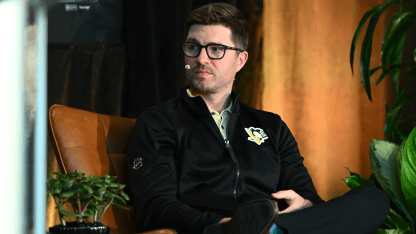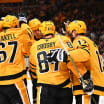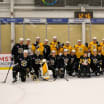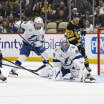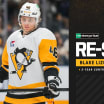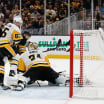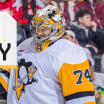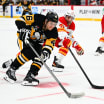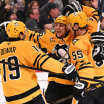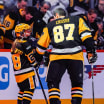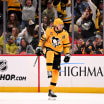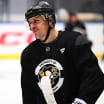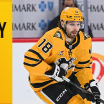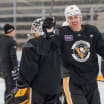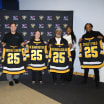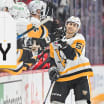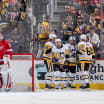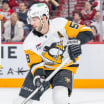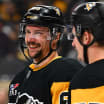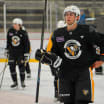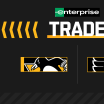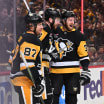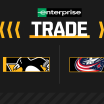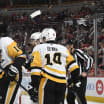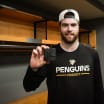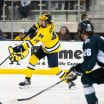JG: What are the immediate plans for each of the prospects as it pertains to their steps forward in the Penguins system?
KD: Ponomarev is going to make his debut tonight, so Wednesday night for Wilkes-Barre against Lehigh Valley. He's had an excellent year with Chicago, and made his NHL debut, first goal, first assist for Carolina. Plays center, is a natural center, plays both special teams… younger player, early 20s. We feel like as the year goes on, he and Sam Poulin are the two that are down there now that are that are really pushing. In his case, he'll come in and if he continues to play the way that he was in Chicago, he'll push and that'll give us some younger flavor kind of coming down the stretch, then guys that can help our team. Koivunen has had an elite, elite year with Karpat in Liiga, so they'll start their playoffs coming up soon. Then depending on where they go and whether he's with the national team or not, we'll probably have him come over to Wilkes. Then Lucius, he and Daniel Laatsch – two of our prospects with Wisconsin – they were upset by Ohio State last weekend. So, they'll be off until the first round of the NCAA Tournament March 28-29th. Of course, being collegiate athletes, they are not eligible to come in for the end of the season, but they'll both be at development camp.
JG: You get that conditional first as well in the trade for Jake Guentzel. I'm curious about that, because I think a lot of people were saying, well, if he's going to trade Jake Guentzel, he has to get a first-round pick – and it could be, if Carolina goes to the Stanley Cup Final. How much were you concerned with that as much as you mentioned the prospects and the players that you could get back?
KD: I think it was more trying to protect the range of the pick than whether to get obsessed about it being a first or first this year, a first all these years. The pick is still, like, the mystery box. Like it could end up being Ponomarev or Koivunen or a Cruz Lucius. You don't know. But for us, the key was to protect the range. So usually in those conditional picks, it's the second or third of the team that goes up to the first. In this case here, it's Philly’s second, (and could be) Carolina's first. If (the Hurricanes) don't go to the Stanley Cup final, it becomes a Philadelphia second. So, rather than have it be between 25 and 64, it’ll depend on what happens with Philly and with Carolina the rest of the year, but it was more to tighten up the range and give us protection and know it may be into the early/mid-50s then drive it all the way back. The key for us was the prospects. So, I can understand why people say it should be X, Y, and Z. But things like those don't tend to move at the deadline.
JG: (In terms of Chad Ruhwedel), was that a hard deal to make? I mean, an expiring contract, I know that there's the limitations there as well.
KD: I think that one was we have a couple guys, younger players, that we wanted to give more legitimate time to. John Ludvig being one, he'd been out of the lineup for quite a while and sometimes you need to do those types of (trades), no matter where you are in your evolution as a franchise. If you have younger guys that are pushing, you want to give them those chances. Ryan Shea and Jack St. Ivany in particular, Jack St. Ivany has played really well for Wilkes. Right shot, penalty kill. So, we're going to continue to have him roll here, but when you're looking at how you're going to evolve and progress, you've got Kris and Erik – and then who's going to fill in that third role? What do you need from them, given what you're getting from the other two? It's going to be penalty killing, size, strength, reach, and Jack brings those. So, it was trying to clear the path to get Ludvig back in, get an opportunity for Jack, and Ryan Shea as well.
JG: You said you anticipated about $12 million in cap space – what’s the tentative plan for that?
KD: I think what that number represents is an opportunity for us to improve across positions. If you take the roster and you stack it back up again next year, essentially, if you look at our team now, we don't have a whole lot of expiring players remaining. We've got Jeff (Carter), who I think that's a ‘we'll see where he is at,’ and I think he's contributed a lot for us this year on and off the ice. He's not scoring like he was when he was in his early twenties and into his early thirties. But penalty-killing, competitiveness, and what he's brought to the locker room has been tremendous for us. And then you've got Ned (Alex Nedeljkovic) as well that expires. Beyond that, it's mostly restricted free agents. So, for us, it's: can we take that money and where can we improve the spots on our roster? Can we slot guys down? That's our main focus, if those opportunities are there. If they're not, it's how can we use the cap space to acquire assets in other ways? Is it trade? Is it trading for more futures that we can parlay into other facets? So, it will be pretty wide open as we go into the summer. We wanted to position ourselves and give ourselves the options to attack it any different way. Now, we've got a better collection of younger assets to attack and trade, we have the cap space – and we just need to execute on our plan.
JG: You’ve known Bunting for a long time – what led to this being the key present piece of the deal when you moved Jake?
KD: Well, I think in Carolina's case, they needed to have salary come out. Michael's 28 years old, he'll be turning 29 next year during training camp. So, you have him for age 29 and 30 seasons, he’s got two more years left on his deal. I think just in terms of the way that the team plays and wants to play, his ability to forecheck, hunt the puck down – but then also make plays in those tight areas and then get to the net as we saw last night in the 6-on-5 situation to tie the game in Ottawa – that's what he brings. He can make plays at the net; he can keep plays alive for others; he can drive the opponent crazy. Sometimes he can drive his manager and coach crazy as well [laughs]. But he brings great energy day in and day out. He's a real competitor and he's had a really, probably, a tougher road than anybody in our locker room to get to this point. He didn't play AAA hockey until he was 17 years old, so he's had to grind his way all the way up. He's an underdog type. I think the group can use that type of spirit and energy right now.

